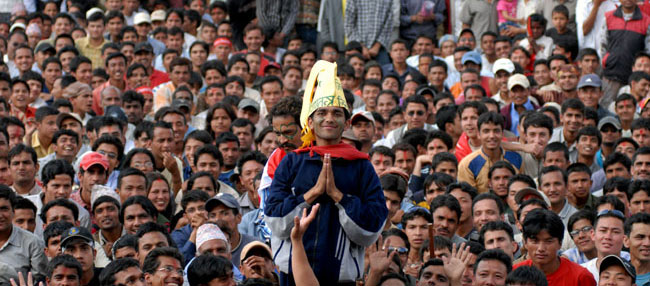 AJAYA JOSHI |
On 1 January 2000 Krishna Prasad Bhattarai was the prime minister and that seems like a long time ago because we've seen 12 governments since.
That's just the politics. The last ten years were particularly good for banks and mobile companies. Remittances skyrocketed. Urbanisation doubled Kathmandu Valley's population.
This is a look back at the most dramatic decade in Nepal's history.
Politics
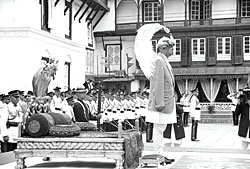 MIN RATNA BAJRACHARYA |
Royal massacre: On the night of Friday, 1 June 2001, King Birendra and members of his family were killed in a shootout in Narayanhiti Royal Palace. The entire country grieved the death of 10 royals at the hands of the crown prince Dipendra, who was believed to have turned on his family due to frustration at not being allowed to marry the woman he loved. According to the findings of the government inquiry, Dipendra carried out the massacre single-handedly, then turned a gun on himself. Still, he was made king and died whilst in a coma three days later.
Raging war: The massacre gave impetus to the Maoist revolution. The Maoists attacked the Royal Nepal Army base in Ghorahi in November 2001, dragging the army into a war that till then had been fought by the police. More people were killed in 2001-2002 than in all previous five years of the conflict. Human rights violations were rampant on
both sides.
Royal takeover: On 1 February 2005, King Gyanendra dissolved parliament and took complete control of the government, blacked out the media and even switched off mobile phones. Fundamental rights were suspended and newspapers were censored.
Mainstream Maoism: On 22 November 2005, rebel leader Pushpa Kamal Dahal and the Seven Party Alliance signed a 12-point agreement brokered by India to counter the king's rule. "It has become the need of today to establish peace by resolving the 10-year-old armed conflict through a forward-looking political outlet," the agreement stated. The Maoists thus entered into an alliance with the main political parties.
Jana Andolan, Madhes Andolan: The seven parties and the Maoists launched peaceful prom-democracy street protests on 6 April 2006. In 19 days, Gyanendra was forced to reinstate parliament and step down. Ten years and over 16,000 lives later, the Maoist insurgency finally drew to a close with the signing of the Comprehensive Peace Accord on 21 November 2006.
"Beginning today, the politics of killing, violence and terror will be replaced by the politics of reconciliation," Prime Minister Girija Prasad Koirala said.
"This is the victory of the Nepali people and the defeat of regressive elements," Maoist chairman Dahal said, adding, "The people will perform another miracle by working on a war-footing to develop their nation after the elections of the Constituent Assembly."
On 17 January 2007, the Madhesi people launched violent protests demanding an amendment in the constitution. The Tarai region saw a surge in violence that continued for about six months as the government addressed their demands on an installment basis.
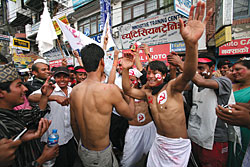 KIRAN PANDAY |
Elections: The CA elections of 10 April 2008 were 'largely peaceful' although there were reports of intimidation and booth capturing. The Maoists emerged as the biggest party, winning 240 out of 601 seats.
The world's youngest republic: The newly formed Constituent Assembly passed a resolution with near total unanimity to declare Nepal a democratic republic on 28 May 2008. "Nepal shall remain a sovereign, independent and integrated, secular and inclusive country," announced the then Home Minister Krishna Prasad Sitaula. This announcement also scrapped all the legal and traditional privileges of the royal family, who became commoners from that point on. The resolution was passed by 560 of the 564 members present.
Political impasse: After months of haggling over the post of president and prime minister, the Maoists formed a government on 16 August 2008 under the leadership of Pushpa Kamal Dahal. Earlier, NC candidate Ram Baran Yadav had been elected the first president of Nepal on 21 July 2008. The Maoist-led government resigned on 4 May 2009 when their attempt to sack the army chief was foiled by the direct intervention of the president. A coalition government of 22 parties led by UML was formed on 25 May. A six-month Maoist obstruction of the House, mirrored by increasingly intense nation-wide protests for civilian supremacy capped by the declaration of Maoist ethnic autonomous councils across the country, ended just short of Christmas 2009. The constitution remains to be written ahead of the May 2010 deadline.
Society
 BHIM GHIMIRE |
While political wrangling continued, the Nepali people showed unbelievable resilience to get on with their lives in the face of major hardships.
Kosi floods: Floods in eastern Nepal in 2002 killed 445 people and left some 128,000 families homeless. Nearly half the country's 75 districts were ravaged. Then in 2008, the Kosi broke its banks and carved a channel of destruction through Nepal and India. Over 70,000 people were displaced by the country's worst flooding in 50 years, and five million were rendered homeless in north India.
Far from home: On 31 August 2004, Islamic militants killed 12 Nepali migrant workers in Iraq. Politicians back home used the massacre to stage protests that soon escalated into an anti-Muslim campaign. Organised attacks vandalised migrant recruitment offices and media houses. It emerged later that most of the victims had contracts falsely promising them jobs in a five-star hotel in Jordan, but were diverted to Iraq by an American contractor, Kellogg, Brown and Root.
Karnali highway: After 15 years, the Karnali Highway linking Surkhet with Jumla was inaugurated in July 2006. Within 11 months, 20 people had lost their lives in 40 road accidents. The army opened the pilot track, but lack of maintenance means most of the highway has since become impassable due to landslides.
Jajarkot epidemic: More than 400 people died from a cholera outbreak in Jajarkot in mid-2009. The government said it sent teams of doctors and drugs to Jajarkot but locals claimed they'd seen neither three months later. Human rights bodies tried to shift the blame on food donors, but the long drought and delayed monsoons that contaminated water supplies were more likely culprits.
Business and technology
 KIRAN PANDAY |
Banking boom: Fuelled by remittance money, the banking sector grew exponentially and Nepal now has more than 40 commercial banks, 60 development banks, nearly 90 finance companies and several hundred cooperatives. There are 160 licensed deposit-taking institutions, and at least 24 financial institutions including five A-class commercial banks are in the pipeline. On 1 January 2010, Nepal will have to allow foreign banks as part of its commitment to the WTO. Local banks may struggle to compete, but consumers will enjoy more choices.
Housing boom: The remittance economy has also fed a housing boom that has resulted in growth in the market for construction material. With more than $1.5 billion entering the country in remittances every year and nowhere to invest but in real estate and housing, the second half of the last decade saw prices skyrocketing. Banks raced to offer loans and now have over Rs114 billion invested in housing and real estate, considered risky assets by Nepal Rastra Bank. It prompted a 25 per cent loan cap on commercial bank exposure. The days of 'unreal estate' may finally be over.
Mobile all over: Nepal Telecommunications Authority auctioned off a private mobile telephone license in 2000, bringing cheaper, and somewhat efficient, phone services to consumers. Nearly six million people in Nepal now own a mobile phone. Mobile phone coverage is available in all 75 districts of the country, as well as the top of Mount Everest. Mobile phones were also crucial in organising dissent during the royal takeover, forcing the king to clamp down on mobile services for four months in 2005.
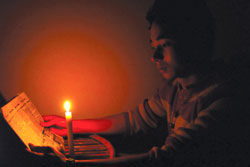 SAM KANG LI |
Dark decade: Despite our much-touted hydro-potential, our energy crisis has gone from bad to worse to absurd, culminating in 16-hour-a-day power cuts in winter 2008. Nepal's second largest hydropower project, Mid-Marsyangdi, finally became operational in 2008. The wrangling over the gigantic West Seti continued through the decade. The future of our CFL bulbs may rest on community micro-hydro projects. An example: Palpa district alone has 22 community hydropower projects that produce electricity at a tenth of the rates of the national electricity supplier.
Culture
 KANAK MANI DIXIT |
Tales of conflict: Narayan Wagle made history with his novel Palpasa Cafe in 2005 selling over 16,000 copies that year. The novel won the Madan Puraskar and is said to have changed the reading habits of Nepali people. Kunda Dixit's trilogy A People War was combined with a travelling exhibition seen by 350,000 people across the country. In fact, it has been a pretty good decade for writers, especially those writing in English. Manjushree Thapa's Forget Kathmandu: An Elegy to Democracy put her on Penguin India's hit list, and Samrat Upadhyay came out with three books. Young writers like Sushma Joshi have followed suit and the literary scene promises much.
Old and new music: Folk music is the most popular music in Nepal and cheap recording technology and mushrooming tv stations have granted artists new-found status. Twenty-seven-year-old Anju Pant's folksy ballad "Na birse timilai..na paye timiliai.." was downloaded by a million people. Nepa-laya organised peace concerts across the country during the insurgency, and continues to nurture uniquely Nepali talent through its regular sit-down jam sessions. Jazz and blues festivals became a fixture on the Kathmandu circuit, and proved Nepal is not quite a backwater.
Documentary capital: Kathmandu seems to have an insatiable appetite for documentaries that is only whetted by festivals like Film South Asia and the Kathmandu International Mountain Film Festival. Filmmakers like Kesang Tsetan, Prem BK and Mohan Mainali made impressive documentaries chronicling tales of the conflict and the Nepali underclass. Tsetan and BK's Frames of War was the biggest documentary blockbuster: it was seen by more than 150,000 across the country. Our commercial film industry, unfortunately, is too busy emulating Hollywood scripts (badly) and lifestyles (with tragic results).
 DEEPENDRA BAJRACHARYA |
Life's a stage: We might not have Mamma Mia or Billy Elliot, but we do get plenty of A Doll's House. Arun Baral's Pratiwimba and Sunil Pokharel's Aarohan theatre groups are the two pillars propping up theatre life in Nepal. In the last ten years, they have introduced classic foreign theatre to Nepali audiences with junkets like the Ibsen Festival.
Sports: Nepali sports fans haven't had much to cheer about. For the most part, our teams have fared poorly in international competitions. The national football team won a bronze medal in the 1993 South Asian Football Federation Cup, but has made early exits in most competitions since. Our martial artists haven't done much better, winning several medals in regional tournaments, but none in the Olympics. Our national sports authorities haven't helped. The top division of the domestic football league, for instance, was inactive for years because of rifts between the Nepal Sports Council (NSC) and the All Nepal Football Association.
Cricket, however, is a different ball game altogether. The Nepali national youth cricket teams first hit the headlines when they reached the finals of the ACC trophy in 2000, and went on to win the ACC Premier League in 2004 and 2006, and the Plate Championship in the 2006 Youth World Cup. Such success was in large part the result of a concerted state effort to develop the sport, and perhaps NSC's Vision 2020 will change our fortunes.
Media
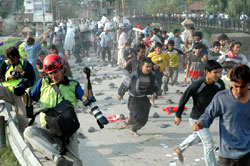 KIRAN PANDAY |
Journalists in the cross-fire: Whether working as district correspondents in Maoist strongholds, or at headquarters in Kathmandu, journalists faced threats and censorship, and 29 lost their lives on the job at the hands of the state and the rebels.Lournalists were arrested right after the royal massacre, Maoists killed journalists like Gyanendra Khadka in retaliations, and the army edited copy in newsrooms during the royal takeover. Press freedom continues to suffer.
Mushrooming media: Despite the challenges, Nepali media has flourished. There are now nine privately owned broadsheet dailies and two broadsheets under state ownership. There are 10 television stations and 22 others have been granted operating licenses. The growth of FM stations has been phenomenal throughout the south Asian region: Nepal now boasts 200 FM stations, mostly community-operated, and 150 more are set to go on air soon.
SEE ALSO:
The decade in pictures


